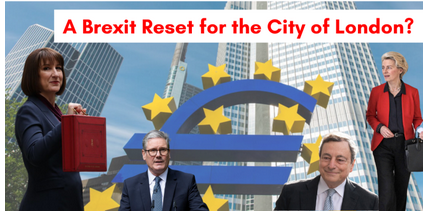Subscribe for Just €5 Per Month: Brussels Finance Watcher's Weekly

For €5 per month, his famous '5-minute read' briefing lands directly in your inbox — saving you hours of research, keeping you ahead of fast-moving regulatory change, and ensuring you never miss a development that matters.
Trusted by professional investors, policy professionals and financial analysts across Europe. (with Live links to all primary sources: ECB, European Commission, ESAs, BIS and more). Why they trust Graham Bishop.

(You can manage or cancel your subscription at any time via Stripe)
--------------------------------------------------------------------------------------------------
The blog from Brussels Finance Watcher's Weekly
5 March 2026
Global geopolitics and financial system resilience dominated this week's EU regulatory agenda. The flare-up of the Iran conflict focused attention on President Trump's actions around the world, which appear to be precipitating a fundamental rethink of relationships with the EU. Iceland seems to be having second thoughts about EU membership, and now Norway is reassessing its links — having watched Switzerland's successful rapprochement with Brussels closely.
Financial system preparedness is firmly on the regulatory agenda, with both the BIS and BCBS speaking out on global resilience. The 20th anniversary of the Global Financial Crisis (GFC) reminded market players of the need to shore up systemic resilience — even as the rules that emerged from that crisis multiply, and banks increasingly shift loans to non-bank subsidiaries to mitigate capital requirements. EBA and ESMA meanwhile continue their work filling in the final details on capital rules for third-country branches, aspects of real estate lending, post-trade risk reduction and algorithmic trading.
In bond markets, the OECD pointed to record sovereign debt levels and — crucially — the emergence of price-sensitive investors raising the vulnerability of government bond markets to sudden shifts in sentiment. A timely warning.
The EU's efforts to simplify its climate resilience rules continue to draw comment from major professional bodies: Insurance Europe, EBF, EFAMA, ISDA and FERMA have all weighed in. On digital assets and market infrastructure, DTCC, Clearstream and Euroclear mapped out a course for interoperability of digital assets — though POLITICO pointed to a darker aspect of the digital world: the world's money launderers are shifting to crypto assets, raising fresh questions for AML supervisors.
Finally, ICMA responded to the UK consultation on expanding its Treasury Bill market to perhaps 15% of total debt stock. Is this really the moment to boost vulnerability to volatile short-term interest rates? A question worth asking loudly.
( Key words: EU financial regulation, global financial resilience, BIS, BCBS, GFC anniversary, sovereign debt markets, OECD bond markets, capital requirements, non-bank financial intermediation, crypto money laundering, digital asset interoperability, UK Treasury Bills, climate resilience rules, EBA, ESMA)
(Previous blogs are archived here)
======================================================================
(Graham Bishop was a member of this Group, and an author)
ELEC position paper: Why EU Capital Markets Union has become a “must have” and how to get there – ELEC Group of Wise Persons
Its report highlighted the need for CMU - with five concrete proposals for action by EU policymakers on insolvency proceedings, securitisation, stimulating retail investment, expand ESMA's powers, check feasibility of a globally significant `safe asset'.
Executive Summary
Five proposals for policymakers
1. Harmonise the key elements of corporate insolvency proceedings and consider adopting an opt-in regime based on international standards, perhaps by “enhanced co-operation” among a willing group of Member States
2. Create the conditions for securitisations to become a complement to bank finance
3. Stimulate retail investment via an array of actions including tax incentives and more auto-enrolment in pension funds
4. Empower ESMA to become the supervisor of wholesale capital markets via joint supervisory teams with national competent authority (NCA) staff
5. Investigate the feasibility of developing the ultimate High Quality Liquid Asset for financial institutions – a “safe asset” in the form of a Eurobill fund
Five reasons why CMU has moved from being `nice to have’ to `must have’:
1. Europe’s green and digital ambitions require more private capital and a more efficient deployment of the existing stock
2. Efficient financial markets with modest asset management fees can produce and protect wealth for ageing populations
3. Mature capital markets provide cheaper and more diversified sources of funding, spurring innovation and economic growth
4. Developed capital markets promote Europe’s strategic autonomy
5. Deep and integrated capital markets strengthen financial stability by facilitating risk-sharing, reducing the strong reliance on bank finance and pricing risks efficiently
more at ELEC-LECE
European League for Economic Co-operation
(ELEC is a network of European entrepreneurs of goodwill, aimed at putting timely intellectual pressure on European decision makers to further economic integration in Europe. It acts in complete independence from national or private interests, public authorities or any pressure groups.)
_____________________________________________________________________________________________
Graham Bishop has drawn together a collection of his earlier works on the possible role of “market discipline” in ensuring financial stability in the Economic and Monetary Union (EMU). The first paper was published by Salomon Brothers in 1989 during the Maastricht Treaty negotiations and the final paper in the series was published in 1993. They established Graham Bishop's reputation as a thinker about the practical mechanics of the single currency - set within the political choices about financial market regulation.
His central point was that public debts denominated in a currency that a government could not order to be “printed” – the euro – had a fundamentally different credit quality than paper money that could be printed at will – in extremis. That different quality should be reflected properly in the then-newly developed system of risk weightings for banks holding public debt as a core asset. This argument was seen as an `inconvenient truth’ at the time.
Three decades on, Italy’s blocking of revision to the ESM Treaty and Germany’s unwillingness to complete the European Deposit Insurance Scheme (EDIS) illustrate that risks to financial stability remain significant – if merely latent.
******
==============================================
My recent papers on the City of London after Brexit have stirred great interest - with several videos.
____________________________________________________________________________________________
I have recorded a video with the Federal Trust's Brendan Donnelly to set out my views about the prospects of a Brexit reset for the City of London. Sadly, I believe hopes of a major improvement are doomed as the plans will inevitably founder on the rock of derivatives clearing.
The UK has never publicly shown any sign of recognising the EU’s concerns about its financial stability flowing from potential problems in the derivatives markets but the EU has kept on legislating to resolve potential problems. Most recently the “Active Account Requirement” (AAR) was enacted and becomes operational in a matter of days.
That will probably be too late to retain the current June 30th ending of the EU’s equivalence decision for UK CCPs. So it may have to be rolled over for say another 18-24 months. Accordingly, any further renewal will be overshadowed by the possible consequences of the UK’s 2029 General Election and the possibility of a Brexit-favouring government.
As always, I am delighted to receive any feedback at graham@grahambishop.com

A Brexit Reset for the City of London?
My rough speaking notes for the video are here and my detailed 2022 evidence to a House of Lords enquiry is here.
Three years after leaving the EU, there are no discernible signs of any benefits for UK finance. There are multiplying signs of a lack of substance to the initial, bold slogans. I polled the audience on whether the UK will become a `rule-taker' for green and digital finance? I was very surprised at the strength of the audience response: 84% agreed strongly/somewhat and only 11% disagreed somewhat!
_____________________________________________________________________________________
In this latest Federal Trust video, Graham Bishop describes the growing risks to the City of London from Brexit. He contrasts the methodical approach of the European Union to building its Capital and Banking Union with the confused rhetoric of the British government. He concludes by warning that a smaller City of London will be able to contribute less to the already stretched public finances of the UK.
SPEAKERS:
Brendan Donnelly is the Director of the Federal Trust and a former Conservative MEP. Graham Bishop is a member of the Federal Trust and an analyst and commentator on economic affairs.
_____________________________________________________________________________________________
He has drawn together a collection of his earlier works on the possible role of “market discipline” in ensuring financial stability in the Economic and Monetary Union (EMU). The first paper was published by Salomon Brothers in 1989 during the Maastricht Treaty negotiations and the final paper in the series was published in 1993. They established Graham Bishop's reputation as a thinker about the practical mechanics of the single currency - set within the political choices about financial market regulation.
His central point was that public debts denominated in a currency that a government could not order to be “printed” – the euro – had a fundamentally different credit quality than paper money that could be printed at will – in extremis. That different quality should be reflected properly in the then-newly developed system of risk weightings for banks holding public debt as a core asset. This argument was seen as an `inconvenient truth’ at the time.
Three decades on, Italy’s blocking of revision to the ESM Treaty and Germany’s unwillingness to complete the European Deposit Insurance Scheme (EDIS) illustrate that risks to financial stability remain significant – if merely latent. _________________________________________________________________________________________
Federal Trust VIDEO with Bishop and Stevens: Brexit is Crippling the City of London
In this video, our Council member, financial expert Graham Bishop, reviews the prospects for the City of London after Brexit. He argues that the British government’s “Edinburgh reforms”, designed to help the City, are little more than pro-Brexit propaganda. They will usually make little difference and in some cases risk repeating the mistakes which led to the financial crisis of 2007-2009
__________________________________________________________________________________________
Studio Europa Maastricht: Looking back at ‘Euro at 20: shifting paradigms?’ - Graham Bishop's contribution
Studio Europa Maastricht organised the conference Euro at 20: shifting paradigms? to commemorate the 20-year anniversary of the euro and the EMU. In this blogpost we will share all photos, videos and transcripts of the day with you.
About Euro at 20
At Euro at 20 economists, politicians, journalists and central bankers engaged in dynamic discussions with each other and the many attendees. The conference consisted of keynote lectures and various sessions on topics about the euro and the Economic and Monetary Union (EMU).
Takeaways
The general consensus of the experts was that the euro and the EMU structure it was built on have come a long way in the last 30 years. However, there were also critical voices that stated there are still challenges to overcome. Notably, the proposed solution to these challenges can be summarised in one word: solidarity. Be it through fiscal transfers, EU recovery funds or Eurobonds, solidarity is imperative for protecting and sustaining the EMU’s unique yet fragile equilibrium.
It was inspiring to hear the constructive visions the diverse group of attendees had on the euro’s future. The Q&A sessions that followed the panels allowed for lively debate between experts and the audience on the actions needed to reach this envisioned future. What everyone could agree on, however, was that the currency policymakers had in mind when signing the Maastricht Treaty, is one worth working for.
Studio Europa Maastricht
__________________________________________________________________________________________________
Financial Services Club/ZYen video with Alderman Mainelli and Graham Bishop: Brexit: Ending the City's Dominance of European Finance?
Among other implications, the loss of its status as the main Euro clearing centre might also put in jeopardy its role as the leading global US Dollar hub.
__________________________________________________________________________
GrahamBishop.com analysis targets the interaction of the driving forces of politics and economics as they force the required changes in financial regulation – at the macro level rather than covering the micro aspects of detailed implementation. These are precisely the topics where a well-informed financial professional should remain competent – as part of their Continuing Professional Development (CPD).